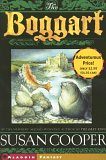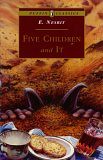Now Reading: Madame Chiang Kai-shek: China's Eternal First Lady
Just Finished: George Washington, Spymaster: How the Americans Outspied the British and Won the Revolutionary War, Adrian Mole and the Weapons of Mass Destruction, Shug
I was really looking forward to finishing up Madame Chiang Kai-Shek this weekend, but I left it at work, because I'm smooth like that. Ah well. Here are some great, classic works of children's literature that I really should have read when I was 12.
The Boggart by Susan Cooper
The Volnik family has inherited an old, Scottish castle. They can't keep it, but they go off to Scotland to see it and get it ready for sale. They decide to have some of the furniture shipped back to Canada, but that's not all that comes--the castle's Boggart, a practical joke playing spirit, has gotten trapped in one of the boxes and has landed in a modern, large city.
The Boggart is full of good-natured mischief and he does like some things about modern living--pizza for one, and electricity. Where the youngest Volnik, Jessup, enjoys this behavior, the older one, Emily, gets blamed for it-- the Boggart's well meaning actions often land her in trouble. Eventually, she is accused of causing psychic disturbances and it looks like she will have to be hospitalized. The Boggart feels terrible, but everything he tries to help just makes things worse. All he really wants it to go home, but how?
I would have loved this book when I was 12. I liked the portrayals of small village life in Scotland and how the Boggart tried to fit into his new surroundings. I liked the kids, too. Part of the problem is that it's a high-tech solution, but, given that this book came out in the early 90s, the technology is so horribly out of date that it seems a bit laughable now. The Boggart's mischief also would have been a lot more humorous at the age of 12 then I found it at the age of 26.
Tom's Midnight Garden by Philippa Pearce
Tom is shipped off to spend the summer at his aunt and uncle's flat when his brother comes down with measles. Not only does he have to live there, but, he's confined to the flat because he's been exposed to the disease. One night Tom hears the clock downstairs strike 13 and finds a garden that only exists in this lost hour. During his time in the garden, Tom befriends a small girl, Hatty, who is often ignored by her older (male) cousins. Tom knows that Hatty doesn't exist in his time plane and has to find a way to stay with his aunt and uncle.
I think the thing that got me the most was the timing in this book. There are a a few scenes of Tom and Hatty meeting and then you see Tom no longer missing his brother and being distraught at the thought of leaving his aunt and uncle's (and therefore the garden). I thought that these scenes were just representative of a long and building friendship, but then you find out that Tom's only been there for a little over a week (and he didn't get to the garden the first few nights). It just didn't make sense. I also found the ending twist painfully obvious, but I think that Pearce was a pioneer in this respect. This is, however, one of Silvey's 100 best books for children. When I was 12, the wonder and magic of the garden would have captivated me a lot more and I would not have noticed the weird timing and I don't think I would have figured out the ending so soon.
Five Children and It by E. Nesbit
Five children are staying at a country house and are enthralled by all the freedom it has to offer. While playing in a nearby gravel pit, they find a Psammead (a sand fairy) who will grant them their wishes, but everything they wish for goes horribly wrong.
This was disappointing, because it became painfully obvious that my childhood favorite, Half Magic, completely ripped off the plot from this book (but totally did it better). Edgar gives full credit and props to Ms. Nesbit, but still, completely heartbreaking.




No comments:
Post a Comment